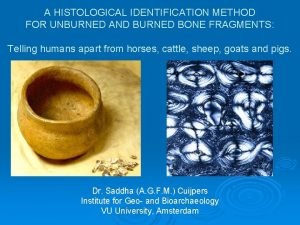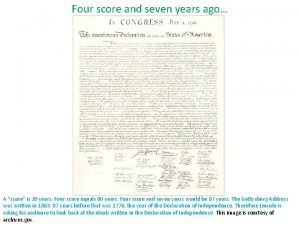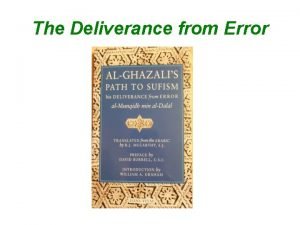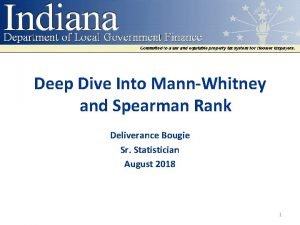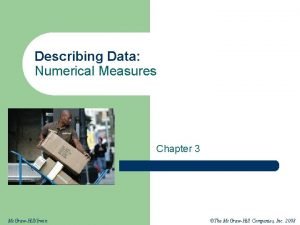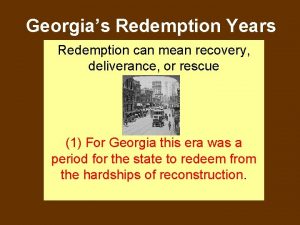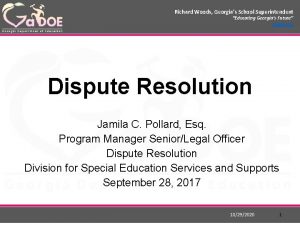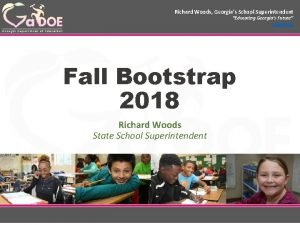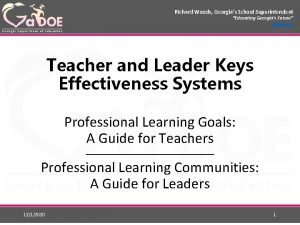Georgias Redemption Years Redemption can mean recovery deliverance























- Slides: 23

Georgia’s Redemption Years Redemption can mean recovery, deliverance, or rescue (1) For Georgia this era was a period for the state to redeem from the hardships of reconstruction.

Atlanta experienced a “rebirth” after the Civil War and began its “rise from the ashes, ” slowly becoming one of the more important cities in the South.

A City Rises from the Ashes • Atlanta becomes capital in 1868 • Entrepreneurs, both black and white, developed new services and products. • “New South Era” was a time of terrible racism and injustice. • Segregation became the law of the land • Women played a big role in reform.

The Bourbon Triumvirate • (3) Three democratic leaders that heavily influenced Georgia Politics from 1872 -1890. Triumvirate means ruling party of three • Three Democrats that tried to help Georgia rebuild after Reconstruction • Dominated Georgia politics for nearly 30 years; rotated positions of governor/U. S. Senator 70 s-90 s. • Wanted stronger economic ties with industrial North • (2)Protected white supremacy, the belief that the white race is superior to any other race.

Joseph E. Brown • Born in South Carolina but grew up in Georgia • Graduated from Yale • Opened a law office in Canton, Georgia • (4)State senator from 1849 until 1855 • Judge for Blue Ridge Judicial Circuit • Elected Georgia’s governor in 1857 and reelected for 3 more terms • Appointed chief justice of the Georgia Supreme Court • Appointed state seat after Gordon resigned and stayed there until 1891 • Trustee of UGA for 23 years • President of the Atlanta Board of Education

Alfred H. Colquitt • Born in Walton County Georgia. • Son of US Senator (Colquitt County is named for his father) • Princeton University • Fought in the Mexican War • State Senator with Brown in 1849 • Major General in Civil War • Elected Governor in 1876 and serving until 1882 • He was tried for corruption, but found innocent • Reduced state debt and a new state constitution was approved 1877, the next one would be 1945 • Served in the US Senate 1883 and 1888, died 1894

John B. Gordon • • • Son of a minister, born in Upson County Attended the University of Georgia Worked as a newspaper correspondent Manager of a coal mine in Dade County at beginning of Civil War Lt. General in Civil War In 1872, he became a US Senator defeating Alexander Stephens In 1880, he resigned the senate and worked with railroads In 1886, he became Georgia Governor and served two terms Reduced debt and brought industry into the state Returned to US Senate in 1891 -1897 Gordon College in Barnesville, is named after him.

(5)Decline of the triumvirate Positive Contributions • Lowered taxes • Reduced war debt • Expanded business and industry Criticisms • Did little to help – the poor and lower middle class – Education – Improve factory working conditions – Improve mental hospitals or convicts.

(6)The Feltons Challenge the Bourbons • William and Rebecca Latimer Felton: – William was a doctor, Methodist preacher, farmer, and public speaker. – Both were leaders of the Democratic Party • Their family owned The Carterville Courant, a newspaper. • They used their paper as a platform to criticize the Bourbon Triumvirate. • Brought attention: – Unfairness of the convict lease system – Causes of the poor and middle class – Worked for fairness and justice • Rebecca was a leader in Women’s Suffrage and Temperance Movements • In 1889, Hoke Smith asked her to be a columnist for the Atlanta Journal. • She remained with the Journal for 41 years.

The Convict Lease System • During the Civil War prisons were destroyed • After the War, lack of jobs led to crime • What was the state to do with increase of prison population? (90% were black) • One solution was the Convict Lease System

(7)Convict Lease System Prisoners were leased out to people who would provide them with housing and food in exchange for labor. Benefits • The state did not have to support the cost of prisoners • Initially, prisoners completed public works projects Criticisms • Companies profited and did not care for the convicts adequately • Some prisoners were worked to death • Paid laborers lost out on jobs • Increased the large number of poor and unemployed.

The Populist Movement Dr. and Mrs. Felton pushed for: –Improvements in Education –Improvements in Prison reform –Limits on alcohol traffic

Henry W. Grady, the South’s Best Salesman • (8) Grady spoke frequently about the “New South” describing it as a more economically diverse and industrialized like the north. • Spoke of the growing southern economy, replacing agriculture with industry, textile mills, coal and iron mining, and tobacco factories • He wanted African Americans to become partners in developing the “NEW SOUTH” • Video Grady died of Pneumonia at the age of 39. He accomplished much in his short life.

(9) Henry W. Grady • • • Born in Athens Graduated UGA Attended 2 years of law school Worked for a newspaper Hired as Southern correspondent for the New York Herald Became managing editor of the Atlanta Constitution Visionary for the New South Believe that African Americans were partners for the New South Helped establish Georgia Tech Helped raise money for YMCA in Atlanta Died at age 39 of pneumonia.

International Cotton Expositions 1881, 1885 & 1895 • Established to promote Atlanta’s industry & accomplishments

International Cotton Exposition • Similar to the World’s Fairs held during same time period • Aimed to lure northern investment into region • Heavily promoted by Henry W. Grady During 1895 Exposition, Booker T. Washington gave his famous Atlanta Compromise Speech.

Education in the New South Era Outline (10) Georgia’s 1868 Constitution called for free public education for all children o f the state. (11) Most Georgians did not value education beyond the 8 th grade and believed children’s time could be spent better working on farms or in factories. Georgia only required a three month school year. Schools were segregated.

Teacher Training late 1800 s a. People who wanted to teach took a test (70=passing) b. Most had never been to college c. In 1882, 252 teachers went to school in Georgia

Textile Mills (12) A textile mill is a factory that used raw materials such as cotton or wool to produce textile for cloth. Main manufacturing centers were located along the Fall Lin in Augusta, Columbus, and Macon for water power provided by the rivers. • Video

Joel Chandler Harris • Born in Eatonton, Georgia • Humorist (comedian) • Wrote about Southern past (slave, cabins, cotton fields) • Most famous book- Uncle Remus • Wrote for Atlanta Constitution for 25 years • Wrote editorials dealing with southern race problems

Sidney Lanier • • Native of Macon, Georgia Gifted musician Graduated from Oglethorpe University Captured during the Civil War; served 5 months in prison; released and walked home from Maryland to Macon • Played flute in the Peabody Symphony • Taught at Johns Hopkins University • One of America’s most successful poets

Charles Henry Smith • • • Humorist/Satirist Wrote for Atlanta Constitution Native of Lawrenceville Attended Franklin College Served in Confederate Army Elected to state senate Elected mayor of Rome Worked as journalist for Rome Courier Created “Bill Arp” character, a simple Georgia cracker with little education and backwoods dialect.

Farmer’s Alliance • Began as a social group but formed cooperative buying stores (co-ops) to purchase goods directly from producers to buy seeds, fertilizer and farm tools at lower prices. This group grew into a political party, The Populist Party that lobbied for farmers.
 Georgias regions
Georgias regions Georgias geography
Georgias geography Georgias colony
Georgias colony Georgias climate
Georgias climate Georgias region
Georgias region Goat years to human years
Goat years to human years 300 solar years to lunar years
300 solar years to lunar years Four score and ten years ago
Four score and ten years ago How to maintain deliverance
How to maintain deliverance Spirit of python
Spirit of python Deliverance from error
Deliverance from error Regions of captivity
Regions of captivity Praise god for past deliverance
Praise god for past deliverance Deliverance bougie
Deliverance bougie Deliverance questionnaire
Deliverance questionnaire It is easy to forget how difficult life was 50 years ago
It is easy to forget how difficult life was 50 years ago Speciation can only be observed over millions of years
Speciation can only be observed over millions of years Population mean and sample mean difference
Population mean and sample mean difference How to find mad
How to find mad Sample mean
Sample mean Is the point estimate the mean
Is the point estimate the mean Mean of the sampling distribution of the sample mean
Mean of the sampling distribution of the sample mean What does mean mean
What does mean mean Define mean deviation
Define mean deviation





